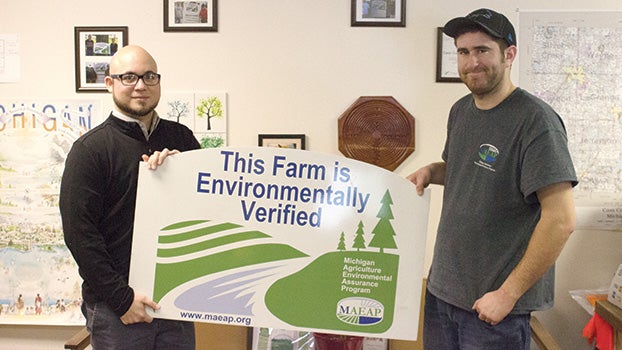Conservation district helping local farms get eco friendly
Published 6:50 am Thursday, January 11, 2018
CASSOPOLIS — Growing produce and raising livestock in an environmentally-friendly way is not just vital for the preservation of Cass County’s lush and bountiful farmlands.
For local farmers, being good stewards of their lands can help their bottom line, as well.
Last year, Ontwa Township’s Dan Stutsman worked with members of the Cass County Conservation District to get his more than 600 acres of farmland verified through the Michigan Agriculture Environmental Assurance Program, a system that helps state farm owners follow best practices to prevent or minimize agricultural pollution risks.
As part of the assessment of Stutsman’s farm, the conservation district’s MAEAP technician, Erez Brandvain, performed a test on the property’s soil, which found the dirt contained a high level of phosphorus.
Thanks to that discovery, Stutsman cut the amount of fertilizer he normally uses for his crops by half this year — a decision that appears to have literally paid off.
“I didn’t see a difference in the quality or yield of my crops,” Stutsman said. “I plan on doing the same this year, as well.”
Thanks to a new cost sharing program the local conservation district has introduced to its MAEAP assessment program, it is easier than ever for Cass County farmers to reap the same kind of benefits Stutsman and other local verified farmers have found.
The conservation district recently received $3,000 in funding, money that Brandvain can spend to help pay for soil, irrigation and other tests on farmlands owners are interested in having MAEAP verified. The money may also help cover the costs of minor improvements needed to help landowners receive the status.
Since taking over as the local conservation district’s MAEAP technician two years ago, Brandvain has helped 25 Cass County farms receive their verification through the program.
To receive the designation, Brandvain must first visit the farm site and perform a risk assessment of the property, where he checks everything from the amount of chemicals in the soil to how deceased livestock are disposed of, depending on the type of farm he is visiting. Following the assessment, Brandvain works with the owner to develop a plan on how to address the potential environmental risks on their property.
“Farmers can go from having no idea they were doing anything wrong to being a poster child of doing things by the book,” Brandvain said.
Helping Brandvain with this process is Frank Velazquez, the district conservationist with the federal Natural Resources Conservation Service. Velazquez works with land owners to build and development more environmentally-friendly farming methods, with federal dollars often covering a majority of the costs to implement, he said.
Throughout the entire process, land owners have the choice as to whether or not to adopt these recommendations, without fear of reprisal from the state.
“At the end of the day, it is their land — and their decision,” Velazquez said.
Once all the proposed improvements are in place, an inspector with the Michigan Department of Agriculture and Rural Development will visit the farm to perform the final verification.
MAEAP verification comes with a number of benefits to farmers, including protection from fines in the event of manure spills, reduced insurance costs and greater clearance to use high-grade pesticides on their property. The land owner also receives a sign that recognizes that their property is MAEAP verified.
“We want to create a common mindset that there are environmentally friendly ways to farm,” Brandvain said, about why the conservation district is invested in the MAEAP program. “They are not just unique to small farms, either. Anyone can implement these methods and be successful.”
People interested in the program can call the conservation district office at (269) 445-8641, ext. 5.







